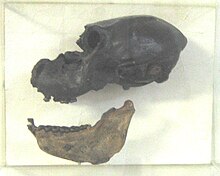Paralouatta
| Paralouatta Temporal range: Miocene–Pleistocene
| |
|---|---|

| |
| Paralouatta varonai skull | |
| Scientific classification | |
| Kingdom: | |
| Phylum: | |
| Class: | |
| Order: | |
| Family: | |
| Subfamily: | |
| Tribe: | |
| Genus: | †Paralouatta Rivero & Arredondo, 1991
|
| Species | |
| |
Paralouatta is a platyrrhine genus that currently contains two extinct species of small primates that lived on the island of Cuba.
The Cuban fossil primate, Paralouatta varonai was described from a nearly complete cranium from the late Quaternary in 1991. This cranium and a number of isolated teeth and postcranial bones were found in a cave site in Pinar del Río Province. The initial description of the cranium included a proposal that Paralouatta varonai was a close Caribbean relative of the extant Alouatta (howler monkeys) of Central and South America,[1] but this taxonomic placement has been called into question with the analysis of the dental remains.[2] Based on shared similarities with the two other Caribbean primates Xenothrix mcgregori and Antillothrix bernensis, MacPhee and Horovitz have proposed that the Caribbean primates are part of a monophyletic radiation which entered the Caribbean at the Oligocene–Miocene boundary. More recent research confirms this assessment and places these three species in the tribe Xenotrichini.[3] Limb modifications and its large size suggest it was partly terrestrial, and a likely example of island gigantism.[4]
A second species of Paralouatta (P. marianae) has also been described from early Miocene deposits (~18 million years old), and is the largest Neotropic primate known of that epoch.[4]
References
- ^ Rivero, M.; Arredondo, O. (1991). "Paralouatta varonai, a new Quaternary platyrrhine from Cuba". Journal of Human Evolution. 21: 1–11. doi:10.1016/0047-2484(91)90032-Q.
{{cite journal}}: Unknown parameter|lastauthoramp=ignored (|name-list-style=suggested) (help) - ^ Horovitz, I.; MacPhee, R.D.E. (1999). "The quaternary Cuban platyrrhine Paralouatta varonai and the origin of the Antillean monkeys". Journal of Human Evolution. 36 (1): 33–68. doi:10.1006/jhev.1998.0259. PMID 9924133.
{{cite journal}}: Unknown parameter|lastauthoramp=ignored (|name-list-style=suggested) (help) - ^ MacPhee, R.D.E.; Horovitz, I. (2004). "New Craniodental Remains of the Quaternary Jamaican Monkey Xenothrix mcgregori (Xenotrichini, Callicebinae, Pitheciidae), with a Reconsideration of the Aotus Hypothesis". American Museum Novitates. 3434 (1): 1–51. doi:10.1206/0003-0082(2004)434<0001:NCROTQ>2.0.CO;2.
{{cite journal}}: Unknown parameter|lastauthoramp=ignored (|name-list-style=suggested) (help) - ^ a b MacPhee, R.D.E., Iturralde-Vinent, M.A., and Gaffney, E.S. (February 2003). "Domo de Zaza, an Early Miocene Vertebrate Locality in South-Central Cuba, with Notes on the Tectonic Evolution of Puerto Rico and the Mona Passage". American Museum Novitates. 3394 (1): 1–42. doi:10.1206/0003-0082(2003)394<0001:DDZAEM>2.0.CO;2.
{{cite journal}}: CS1 maint: multiple names: authors list (link)
